- Home
- Gregory Ashe
Transposition
Transposition Read online
TRANSPOSITION
GREGORY ASHE
COPYRIGHT 2018
THE CALL ABOUT THE SHOOTING came when everyone else was packing up, and of course Somers volunteered to take it. Emery Hazard sat at his desk, glaring at his partner as the detective spoke quietly into the receiver. There were days, Hazard thought, when Somers made things harder than they needed to be. Most days, come to think of it.
John-Henry Somerset, who went by Somers, ignored Hazard’s glares the way he seemed to be oblivious to everything unpleasant. Somers, with his short, messy blond hair and his perfect good looks, managed to make cheerfulness seem easy. It was one of the few things you could hate about the man. You couldn’t, Hazard decided, his gaze lingering a moment too long, hate that smile. You couldn’t hate eyes like that, eyes like tide pools, so blue you could almost see through them. Hazard had spent a lot of his life trying.
As though sensing Hazard’s gaze, Somers glanced up and made a face. Hazard gave him the finger.
Around them, the Wahredua Police Station was closing up shop. Instead of the normal smells of burnt coffee, toner, and Miranda Carmichael’s tomato-cucumber-and-onion sandwich, extra vinegar, the place smelled like floor wax as the custodial crew got an early start. Instead of the hub of voices and ringing phones and the fax machine’s intermittent screech, the station had fallen silent. Even Chief Cravens’s office was dark and empty the night before Thanksgiving. Only a handful of uniformed officers, most of them young, single, and broke, would work Thanksgiving Day—and they’d do it for the extra pay. Them, and Detectives Emery Hazard and John-Henry Somerset. Another example of Somers’s unnecessary helpfulness.
“All right, Mrs. Ferrell. All right. We’ll be out in a little bit. Yes, I understand. Yes, ma’am, right away. Yes.” Somers rolled his eyes for Hazard’s benefit. “I’ll tell her. Yes, ma’am. Goodbye. No, yes, no—goodbye.”
“What were you thinking?” Hazard said as soon as the receiver rested in the cradle.
“What?” Somers was all dewy innocence. He had thick, golden eyelashes, and he was practically batting them now.
“We’re going out there?”
“Hold on. Don’t get mad.”
Hazard surged out of his chair, grabbing his heavy wool coat and jerking his head at Somers. His shoulder twinged from where he’d been shot only a few weeks before, but Hazard shook his head when Somers moved to help with the coat. “If we’re going out there, we’re going right now. Understand?”
“We have to go. It’s a shooting.”
“Jesus, all right,” Hazard said. “Come on, then.”
Somers, however, took his time gathering his coat, shutting down his computer, fiddling with the pens on the desk without managing to make them any more organized. Hazard stared in shock. He had grown up in Wahredua, but he still had trouble adjusting to the importance—or lack thereof—that the local police gave the different calls that came in. A shooting in Hazard’s old precinct, in St. Louis, would have elicited a very different response.
But everything was crazy here. After leaving Wahredua for college, Hazard had never planned on coming back. Until, that was, he’d been booted from his job with the St. Louis City police. When he returned to his hometown, he’d found himself partnered with his old high school bully: John-Henry Somerset. Their first case, solving the murder of a young man named Chendo Cervantes, had brought them together—to a degree. At that moment, staring at his partner, Hazard was forgetting what that solidarity felt like.
“What do you mean it was a shooting? Ambulance? That kind of shooting? Tactical team? What?”
“No, nothing like that.” Somers shrugged into his coat. As they headed out of the station and towards the car, Somers said, “Mrs. Ferrell, she calls about once or twice a month with complaints about shooting. There’s a house nearby with a private range. Eventually, the noise drives her nuts and she calls it in.”
Hazard stopped. It was late November, and this year, the cold had come hard and fast. With the cold, over the last week, had come steady showers: mixtures of rain and slush that turned the roads into skating rinks. The Grand Rivere was close to bursting its banks, and flooding along Market Street seemed like a very real possibility. Several of the smaller bridges in the area had washed out, and half the police work in the last few days had been responding to stranded travelers. Standing there, huffing out huge steaming breaths into the November cold, Hazard tried to rein in his temper.
“We’re taking a noise complaint?”
“Well—”
“The night before Thanksgiving, when I’m supposed to go to Nico’s house for a big dinner before I drive him to the airport, you agree to take a noise complaint.”
As they reached the car, Somers gave an angel-innocent shrug. “It’s kind of our turn.”
Hazard groaned. “Are you trying to sabotage my—”
“Relationship?”
“Don’t start, Somers. My dinner. Is that what this is?”
“It’ll take an hour, tops.”
“An hour?”
“She’s on the edge of the city limits. Technically, that part used to be unincorporated, but it’s a long story. She’s a Wahredua citizen, though, and—”
“It’s bad enough that you volunteered me, without asking, to work Thanksgiving.”
“You weren’t going to visit your family. You already told me.”
“That’s not the point,” Hazard growled. “Maybe I wanted a day off. Maybe I wanted to relax.”
They settled into the car, a tan Impala that belonged to the city, and Somers eased onto the slushy roads. Overhead, gray clouds churned and swirled, and the light was fading fast. In an hour, the daylight would be gone. If Hazard was lucky, and if they didn’t slide off the road or get stuck helping Mrs. Ferrell get her cat out of a tree, or whatever else the hell she might need, he might still make it to dinner.
“You don’t want to relax,” Somers said, cranking up the heater as he pointed the car east. “And you definitely don’t want a day off.”
“I might.”
“You don’t. On your days off, what do you do? I’ll tell you: you go to the gym. You do your laundry. You fold your goddamn socks.”
“People need to do laundry.”
“Not on Saturday and again on Sunday.” Somers settled back into his seat as though he’d won the argument. “And you read.”
“People like reading.”
“You’re not reading for fun. You’re reading because you’re wired and you want to get back to work.”
Hazard grimaced and didn’t respond. Around them, the city shifted: upscale stucco-and-glass buildings faded into weather-beaten stone; stone gave way to brick; brick gave way to a strip of old rail depots with rusting sheet metal and stained concrete slabs. Wahredua had begun as a river town, evolved into a rail town, and had settled into a college town—which seemed, for the foreseeable future, the best bet for keeping the city viable. As they passed the edge of the city proper, brick and stone and steel dissolved into the rolling hills and fields of central Missouri.
“I see Nico,” Hazard said.
“You see Nico,” Somers said in disgust. “That boy hangs on every word you say, every gesture, and you make him watch those stupid movies.”
“Documentaries aren’t stupid movies.”
“They are when they’re about the history of German cheesecloth, 1888-1889.”
“You’re an idiot.” Hazard flopped backward in his seat, feeling inexplicably prickled. Ever since he had moved into Somers’s apartment and become roommates with his partner, he’d worried that they would get tired of each other—especially since Hazard already had a low tolerance for other people. In spite of his fears, though, Hazard had found that the opposite was true: he enjoyed
his time with Somers more every day. Dangerously so, in fact. No, the trouble wasn’t Somers. The trouble was Nico—and, more specifically, the trouble was how much Somers wanted to talk about Nico.
“He’s young. He wants to go out. He wants to have fun.”
“Drop it, Somers.”
“Take him clubbing.”
“I don’t dance.”
“So let him dance up on you. You don’t even have to move. Just stand there like a big lump, like you always do.”
“I don’t stand around like a lump.”
“He wants to show you off. You’re a hot, older guy with a dangerous job. You’re a celebrity. All of that’s wasted if he has to spend his weekends watching documentaries about German cheese.”
“Cheesecloth. And I told you to drop it.”
“Look, all I’m saying is, you hit the jackpot. He’s cute. He’s smart. He worships the ground you walk on. Don’t—”
“If you say don’t screw it up, I’m going to reach down your throat and rip out your lungs.”
“I was going to say, don’t take it for granted. But don’t screw it up, well, that applies too.”
Hazard could hear his teeth grinding as he stared out the window.
It was a lucky thing, though, because if he hadn’t been staring out the window, he wouldn’t have seen the car stranded on the side of the state highway.
“Jesus, I’m never going to make that dinner. Pull over.”
“What?”
“Pull over. There’s somebody stuck back there.”
“It’s just an abandoned car—”
“There’s somebody sitting in it, so unless you want to come back this way and dig out a frozen corpse, pull the car over.”
Somers slowed and found a relatively clear spot along the shoulder of the highway. Hazard climbed out of the car, wincing as he did so. This stretch of highway was relatively bare, surrounded on both sides by snow-swept fields. Wind poured over those fields, cold enough to cut through Hazard’s coat and make him wish, once again, Somers hadn’t been so eager to volunteer.
“Hey,” Somers called, jogging ahead of Hazard and calling down to the car. “Hello. You ok?”
Hazard let his partner take the lead; with anything involving other people, it was always better to let Somers go first.
The car was a small gray sedan, and as Hazard got closer, he could see the problem. About ten yards farther down the road, the driver had attempted a U-turn. Judging by the tracks in the snow, he must have tried to turn at a relatively high speed. He’d caught some traction on the highway’s shoulder—more tracks showed where tires had scraped away snow—but then had slid off the embankment a few yards later.
“See if he’s drunk,” Hazard called to his partner, his voice pitched just for Somers.
“Hello,” Somers called, nodding an acknowledgment to Hazard. The blond man half-fell, half-trampled a path down the embankment until he reached the car. When he pounded on the window, the figure inside—nothing more than a bundle of dark clothing, even to Hazard’s sharp eyes—jumped.
A moment later, the gray sedan’s door popped open, and the driver climbed out into the snow. He was young, maybe only a few years younger than Hazard and Somers. Late twenties, Hazard guessed. He wore a mismatched array of dark clothing: sweaters and jackets and thermal-knit cotton. The outfit could have fit a movie star or a homeless person. His long, dark hair was flattened by a ski cap, and a tangled beard fell almost to his chest.
“Jesus, you scared the shit out of me. What’s the matter, officer?”
Hazard’s eyebrows went up. “What’s the matter?”
Somers waved a hand for Hazard to be quiet. “Just wanted to check and make sure everything was all right.”
The young man snorted. “Does it look like everything’s all right? I’m fucking stranded. Tried to do a u-turn, but I didn’t expect this hick town would leave the roads covered in ice. Can’t get decent cell service, can’t get a tow truck, can’t get back to town.” He eyed them for a moment—his gaze flicked to Hazard only briefly before being drawn back to Somers. That, too, in Hazard’s experience, was normal. Even straight men were drawn to Somers, albeit not in a sexual way. He was just that kind of person. “Well?” the young man demanded.
“Well?” Hazard said.
Somers gave Hazard a warning glance. “Well, it looks like you need some help. And I’d really like to help you.”
“Jesus, this isn’t going to be a fucking civics lesson, is it? If so, I’ll just curl up in the back seat and you can wait while I jerk off with town pride.” The young man threw back his shoulders and projected his voice, as though Somers were slightly deaf, or perhaps a little simple. “I want a tow truck. Call one. Now.”
“Detective Somerset,” Hazard said. “I think a civics lesson might be in order.”
Somers frowned. “I don’t think—”
“Fuck me,” the young man interrupted, ripping off his ski cap. “Are you two fucking deaf? Are you retarded? Get me a tow truck.”
This time, Somers just let out a defeated sigh and nodded.
Hazard stepped towards the young man. That’s all. He just stepped and kept on stepping. Something about his face, though, made the young man take a nervous step back. And then another. And then the young man stepped too fast, and as he collided with the sedan, his feet went out from under him. His head cracked against the window, and he slid down next to the wheel.
“You can’t—you’re threatening me—” The young man was scrambling away on all fours, snow spilling into a greasy head of hair and, Hazard hoped, down the back of the young man’s assortment of shirts and jackets. “This is police brutality, that’s what this is, I’m going to have your fucking badges—”
“I see the problem,” Hazard said, and his low, even voice cut through the young man’s bluster. “Your front tire is about an inch off the shoulder of the highway.”
“No fucking shit, Sherlock.” The young man was still sprawled in the snow and was starting to shiver.
“Here’s a civics lesson,” Hazard said, his voice still that perfectly low calm that, somehow, worked wonders. He hadn’t figured that out until he was a cop, but he’d found it was one of his best tools. “Detective Somerset and I are going to help you out because our job is to protect and serve. Isn’t that right, Detective Somerset?”
Somers was staring at Hazard, fighting a grin and losing. “Yes,” he managed to cough. “Yes, I believe that’s right, Detective Hazard.”
“And when we finish,” Hazard said, “you’re going to say thank you.”
The snow-buried young man said nothing, but his beard was quivering with anger.
“You steer,” Hazard said to Somers.
“No way, I’m pushing. Your shoulder.”
Hazard ignored the response and moved to a position at the car’s tail. His shoulder did still hurt, and trying to heave a mid-sized sedan out of the snow didn’t seem like a particularly bright idea, but he was angry and anger brought out a stubborn streak. Setting himself against the bumper, Hazard nodded towards the front of the car.
With a sigh, Somers wedged himself between the door and the car, bracing one hand on the frame and gripping the wheel with the other. “It’s in neutral,” he called back. “Parking brake off.”
Digging into the snow, Hazard pushed. For a moment, the weight of the car resisted. Hazard’s leather-soled shoes slid in the slushy mud. A starburst of pain ignited in Hazard’s shoulder, a warning flare telling him to stop. Then, he dug his toes into the mud, found purchase, and heaved himself into the car. With a long slurp, the tires inched free of the mud, and the sedan ground forward.
“All right,” Somers shouted. “Front tires are on the pavement. Let me give it a try.”
Hazard sucked in an enormous breath and fought the urge to grip his shoulder and let out a string of curse words. Instead, he tried to put off an air of casual ease.
The sedan’s engine roared to life, and the tires spun. For
a horrible second, the rubber slipped along the snow-slick asphalt. Then they gained traction, and the sedan lurched onto the highway. Somers killed the engine a moment later and stood, blocking the driver’s seat with his body.
“Jesus fucking Christ,” the young man said. He was brushing snow off his back, and he looked much more bedraggled—and miserable—than he had when Hazard and Somers had arrived. “I’m going to catch pneumonia. And you better not have wrecked my transmission, or the frame, or the alignment—”
“Come on, man,” Somers said. “Really?”
“I asked for a tow truck, not for this Neanderthal to dead-lift my car. If I have to have body work done, you can bet you’re going to be hearing from my lawyer.”
“Say thank you,” Hazard said. For the first time since moving the car, Hazard set himself facing the young man. Folding his arms across his chest, he allowed the pain in his shoulder to filter into his face—hoping that the young man would take the expression for anger instead of agony.
“I won’t—uh.” The young man began combing his beard with stiff, hurried fingers. His eyes darted to Hazard’s face, away, and back again. “Yeah, um, thank you.”
“Now,” Hazard said, reaching into his jacket and pulling out a black, vinyl-bound citation book. “License and registration please.”
The young man froze, his fingers locked in the act of combing his beard. “What?”
“License and registration. Right now, please.”
“You’re kidding.”
“License and registration, sir.”
“I slid off the road. I didn’t do anything wrong.” His voice had risen in pitch, and his fingers were tearing through his beard so fast that, in Hazard’s opinion, he’d be lucky if he didn’t rip the damn thing right off. “You can’t do this.”
“Detective Somerset?”
Somers, propping himself on the sedan door, grinned. “Sir, you executed an illegal U-turn at what was clearly an excessive speed. Detective Hazard is writing you what we call a Careless and Imprudent Driving citation, that’s a two-point—”
“This is horseshit, you couple of dong-fuckers. You can’t do this. You didn’t see me, you don’t have any fucking idea what I did.”

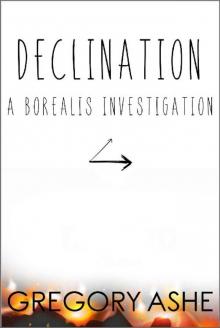 Declination
Declination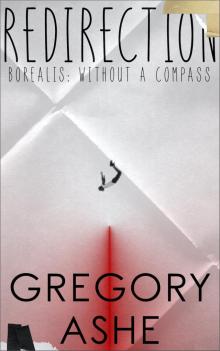 Redirection
Redirection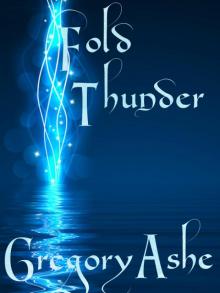 Fold Thunder
Fold Thunder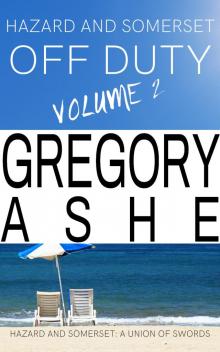 Hazard and Somerset
Hazard and Somerset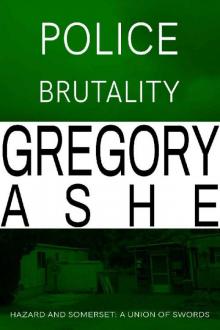 Police Brutality (Hazard and Somerset: A Union of Swords Book 2)
Police Brutality (Hazard and Somerset: A Union of Swords Book 2)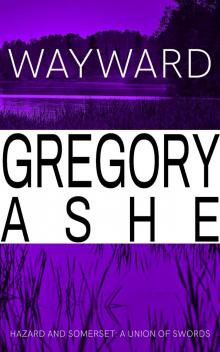 Wayward
Wayward The Same End (The Lamb and the Lion Book 3)
The Same End (The Lamb and the Lion Book 3)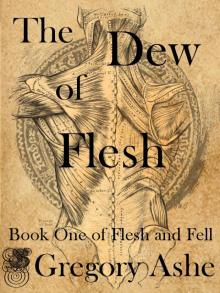 The Dew of Flesh
The Dew of Flesh The Same End
The Same End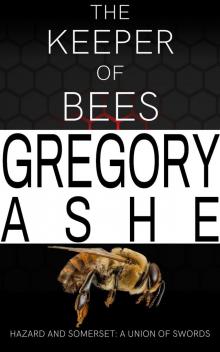 The Keeper of Bees ARC
The Keeper of Bees ARC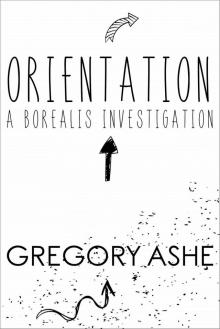 Orientation (Borealis Investigations Book 1)
Orientation (Borealis Investigations Book 1) The Indifferent Children of the Earth
The Indifferent Children of the Earth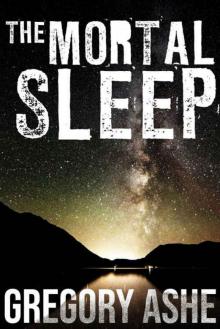 The Mortal Sleep (Hollow Folk Book 4)
The Mortal Sleep (Hollow Folk Book 4)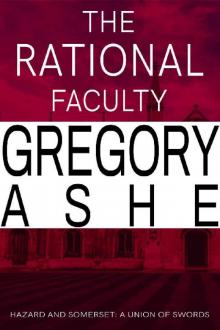 The Rational Faculty (Hazard and Somerset: A Union of Swords Book 1)
The Rational Faculty (Hazard and Somerset: A Union of Swords Book 1)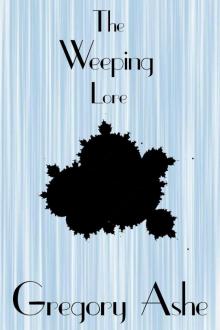 The Weeping Lore (Witte & Co. Investigations Book 1)
The Weeping Lore (Witte & Co. Investigations Book 1)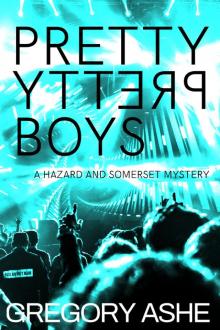 Pretty Pretty Boys
Pretty Pretty Boys Transposition
Transposition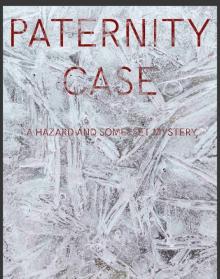 Paternity Case
Paternity Case